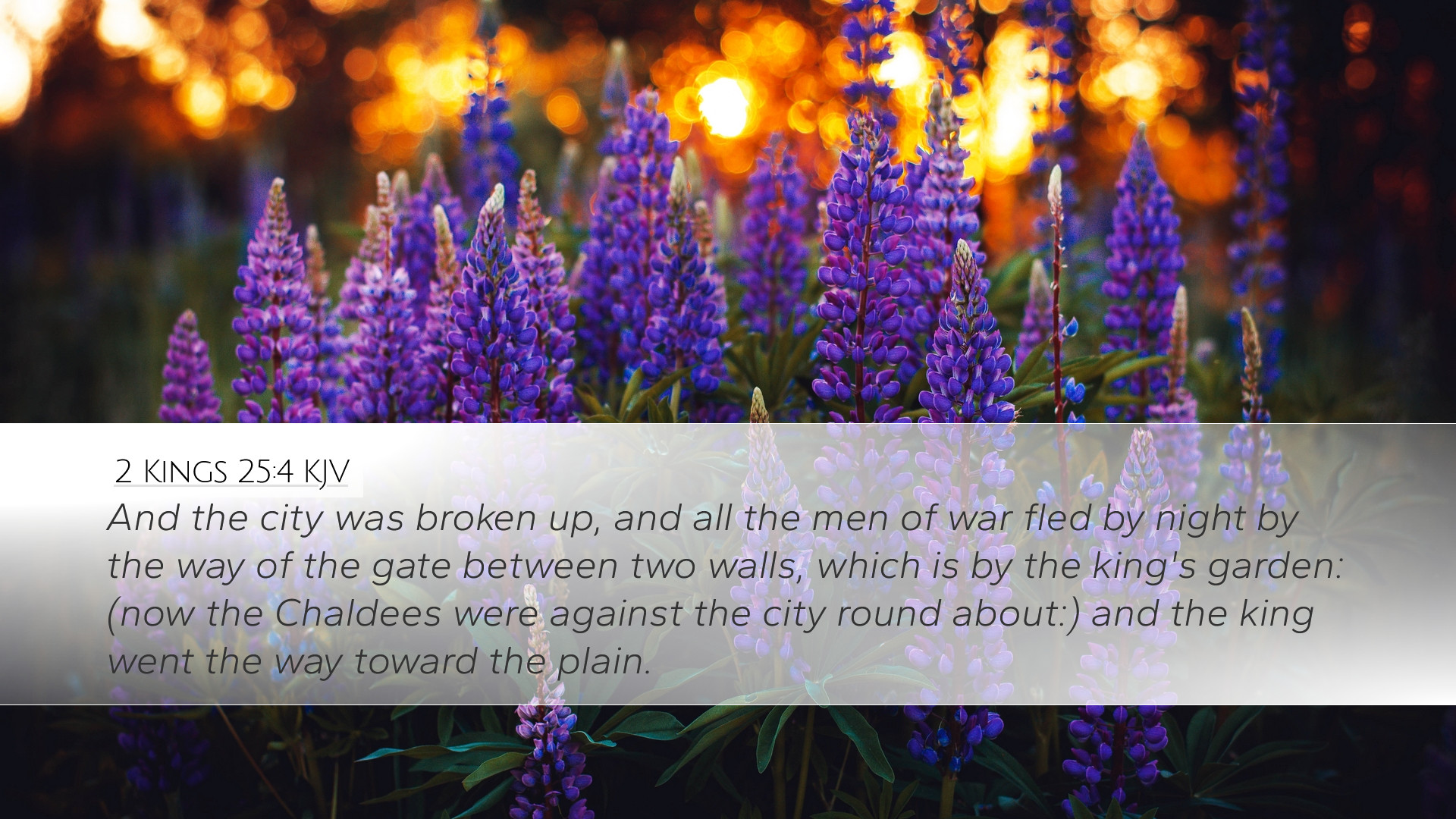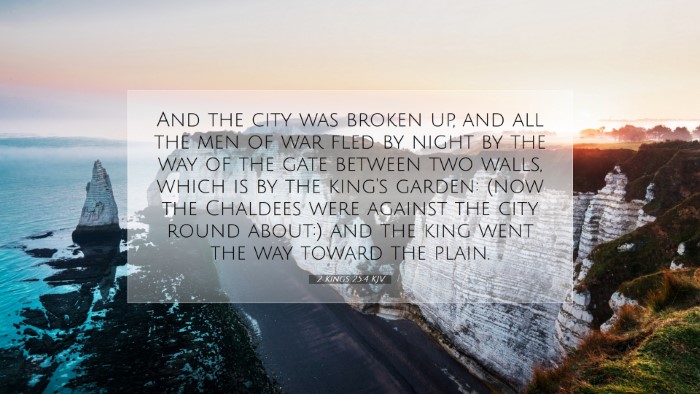Commentary on 2 Kings 25:4
Verse Context: 2 Kings 25:4 states: "And the city was broken up, and all the men of war fled by night by the way of the gate between the two walls, which is by the king's garden; now the Chaldees were against the city round about: and the king went the way toward the plain."
Historical Background
The events of 2 Kings 25:4 occur during a pivotal moment in the history of Israel, detailing the siege of Jerusalem by the Babylonian king Nebuchadnezzar. This passage marks the culmination of a prolonged period of rebellion against God's covenant by the people of Judah, leading to dire consequences.
Commentary Insights
Matthew Henry's Perspective
Matthew Henry interprets this verse within the broader context of divine judgment. He notes that the breaking up of the city signifies the complete desolation and destruction that follows persistent disobedience to God. Henry emphasizes that the flight of the men of war signifies a loss of hope and strength, which had often been found in the reliance on the Lord.
- Fleeing at Night: The act of fleeing under cover of darkness can be seen as a metaphor for the spiritual blindness that had engulfed the people. They abandoned their duty as protectors of the city and their faith in God.
- Symbolism of Gardens: The king’s garden represents a place of beauty and cultivation, now tainted by fear and destruction. It symbolizes the loss of blessing, reflecting the barrenness that results from turning away from God.
Albert Barnes' Interpretation
Albert Barnes provides a historical lens through which we can see the significance of the city’s breach. He elaborates on how the city walls, once a source of pride and protection, are rendered ineffective against the might of Babylon. Barnes underscores the inevitability of judgment when God withdraws His protection.
- Chaldees Surrounding the City: The presence of the Chaldeans encircling Jerusalem indicates a complete siege, emphasizing the hopelessness of the situation. This can represent, in broader theological terms, the continuous spiritual warfare against God’s people.
- The King’s Flight: Barnes suggests that Zedekiah’s flight implies a failed kingship that could not provide security or deliverance. His attempt to escape reflects the ultimate human failure to combat the divine plan.
Adam Clarke's Analysis
Adam Clarke approaches this verse with a keen awareness of its literary elements, framing the event as a tragic climax of Israel's story. He places emphasis on the gravity of leadership failures and divine retribution seen through Zedekiah’s actions.
- Breaking of the City: Clarke states that "the city was broken up" serves as a poignant reminder of the fragility of human constructs when not anchored in divine principles.
- Spiritual Lessons: The flight of the king is not just a logistic retreat but symbolizes abandonment in the face of trial, serving as a cautionary tale to leaders about the importance of steadfastness in faithfulness to God.
Theological Implications
This single verse encapsulates numerous theological themes that are relevant to congregational teaching and personal reflection:
- Consequences of Sin: The plight of Jerusalem serves as a stark reminder of the consequences of turning away from God, challenging believers to consider their own lives and communities.
- Leadership Accountability: Church leaders and pastors can reflect on the responsibilities of their position and the impact of their decisions on those they lead.
- Hope in Desperation: While this verse reflects despair, the overarching narrative of scripture also points towards redemption. This reality means that, even amidst judgment, God’s mercy remains accessible for those who turn back to Him.
Conclusion
2 Kings 25:4 serves as both a historical recount of destruction and a poignant reminder of the spiritual lessons that can be gleaned from the fall of Jerusalem. It implores readers to assess the state of their hearts and the integrity of their faith. The commentaries from Henry, Barnes, and Clarke provide a multifaceted understanding that encourages deep theological reflection and practical application.


